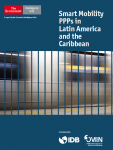A report concludes that increased urbanization and economic growth have led to congestion and pollution in Latin America and the Caribbean (LAC), but that alternative transportation solutions, financed by public-private partnerships (PPPs), can enhance quality of life and protect the environment.
Titled ‘Smart Mobility PPPs in Latin America and the Caribbean,' the report was published by the Economist Intelligence Unit and commissioned by the Multilateral Investment Fund (MIF), a member of the Inter-American Development Bank (IDB) Group.
 15 April 2015: A report concludes that increased urbanization and economic growth have led to congestion and pollution in Latin America and the Caribbean (LAC), but that alternative transportation solutions, financed by public-private partnerships (PPPs), can enhance quality of life and protect the environment. Titled ‘Smart Mobility PPPs in Latin America and the Caribbean,’ the report was published by the Economist Intelligence Unit and commissioned by the Multilateral Investment Fund (MIF), a member of the Inter-American Development Bank (IDB) Group.
15 April 2015: A report concludes that increased urbanization and economic growth have led to congestion and pollution in Latin America and the Caribbean (LAC), but that alternative transportation solutions, financed by public-private partnerships (PPPs), can enhance quality of life and protect the environment. Titled ‘Smart Mobility PPPs in Latin America and the Caribbean,’ the report was published by the Economist Intelligence Unit and commissioned by the Multilateral Investment Fund (MIF), a member of the Inter-American Development Bank (IDB) Group.
The LAC region now has the highest rate of urbanization in the developing world, the study finds. While this has resulted in overcrowded public transportation, pollution and longer commutes, it has also instigated the search for and implementation of mobility alternatives, such as bikes, bus rapid transport (BRT) systems, electric cars and traffic-tracking apps. For example, Argentina, Brazil, Chile, Colombia, Ecuador, Mexico and Uruguay now have bike-sharing programmes, and Latin America accounts for almost two-thirds of the world’s BRT passengers.
Speaking at the report’s launch, David Bloomgarden, MIF, conceded that public transportation and infrastructure have yet to catch up with the pace of population and economic growth in the region. He added that with more than 80% of people living in cities, smart mobility solutions will be critical to increasing prosperity and improving the quality of life for all.
These “smart mobility solutions” often include the participation of both private businesses and government agencies through PPPs, which also finance larger-scale projects, such as metro systems and highways. The report explains that the most popular transportation-related PPPs involve private sector technology that governments would not otherwise be able to offer on their own.
The study was launched at the MIF-organized 2015 PPPAmericas conference, which convened in Punta del Este, Uruguay, from 13-15 April 2015. [IDB Press Release] [Publication: Smart Mobility PPPs in Latin America and the Caribbean]